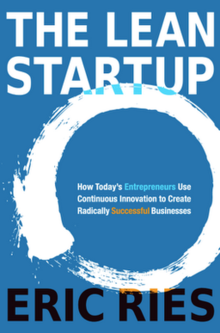This article has multiple issues. Please help improve it or discuss these issues on the talk page. (Learn how and when to remove these messages)
|
 | |
| Author | Eric Ries |
|---|---|
| Language | English |
| Genre | Business, fiction, Entrepreneurship |
| Publisher | Crown Business (USA) |
Publication date | 2011 (USA) |
| Publication place | United States |
| Media type | Print (hardcover) |
| Pages | 336 p. (US hardcover edition) |
| ISBN | 0307887898 |
| OCLC | 770494142 |
The Lean Startup: How Today's Entrepreneurs Use Continuous Innovation to Create Radically Successful Businesses is a book by Eric Ries describing his proposed lean startup strategy for startup companies.[1]
In his book, Ries applies scientific principles to entrepreneurship, advocating for an approach he calls "just-in-time scalability": conducting product experiments without massive up-front investments in planning and design. The book shows the value of actionable metrics for decision-making, and the importance of pivoting (changing course) when necessary.[2]
Ries developed the idea for the lean startup from his experiences as a startup advisor, employee, and founder.[3][4] Ries attributes the failure of his first startup, Catalyst Recruiting, to not understanding the wants of their target customers and focusing too much time and energy on the initial product launch.[5][6][7]
After Catalyst, Ries was a senior software engineer with There, Inc., which had a failed expensive product launch.[5][6] Ries sees the error in both cases as "working forward from the technology instead of working backward from the business results you're trying to achieve."[1]
Instead, Ries argues that to build a great company, one must begin with the customer research and interviews, developing a minimum viable product (MVP), and iterating based on feedback.[8][9] He also recommends the Five Whys technique to identify the root cause of problems.
Companies cited in the book as practicing Ries's ideas include Alphabet Energy of California. Later more organizations have adopted the processes, including Dropbox, Wealthfront,[10] and General Electric.[11]
- ^ a b Roush, Wade. Eric Ries, the Face of the Lean Startup Movement, on How a Once-Insane Idea Went Mainstream. Xconomy. July 6, 2011.
- ^ Patel, Mitul (April 16, 2020). "Book Review: The Lean Startup by Eric Ries". The Bookish Elf. Retrieved June 7, 2023.
- ^ Lohr, Steve. The Rise of the Fleet-Footed Start-Up. The New York Times. April 24, 2010.
- ^ Solon, Olivia. Interview: Eric Ries, Author Of The Lean Startup. Wired. January 17, 2012.
- ^ a b Loizos, Connie. “Lean Startup” evangelist Eric Ries is just getting started. Reuters. May 26, 2011.
- ^ a b Venture Capital: Eric Ries, author of "The Lean Startup". YouTube. November 21, 2009.
- ^ [https://livres-startup.fr/the-lean-startup.html Lean Startup: Adoptez l'innovation continue ]. Livres Startups. December 22, 2022.
- ^ "Book Review: The Lean Startup | Masood Entrepreneurship Centre | The University of Manchester". Masood Entrepreneurship Centre. Retrieved June 19, 2024.
- ^ "Understanding Lean Startup Methodology". Tech Empat. February 20, 2023. Retrieved June 19, 2024.
- ^ "The Lean Startup | Case Studies". theleanstartup.com. Archived from the original on January 16, 2018. Retrieved January 5, 2018.
- ^ "General Electric Wants to Act Like a Startup". Bloomberg.com. August 8, 2014. Archived from the original on March 15, 2016. Retrieved January 5, 2018.